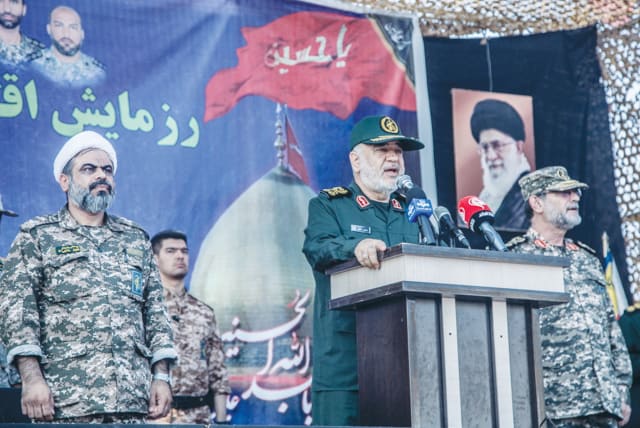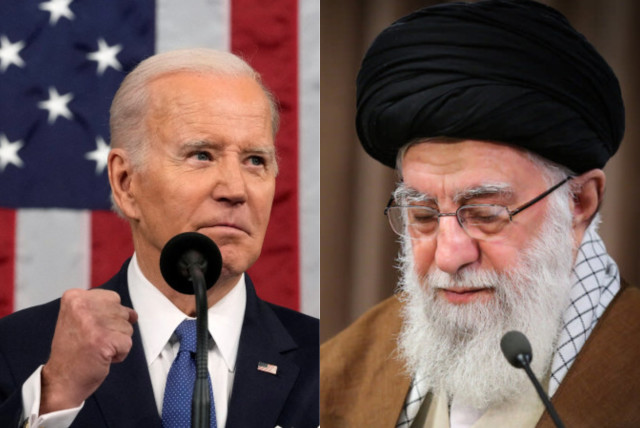Biden's stance against Iran naval aggression heralds new era in the Gulf - opinion

President Joe Biden’s decision to dispatch additional Marines and warships to the Persian Gulf is a strategic move to counter the Iranian regime’s destabilizing activities.
In a strategic decision reminiscent of former president Ronald Reagan’s reflagging operation, the Biden administration is sending additional Marines and warships to the Persian Gulf, taking direct aim at Iran’s aggressive tactics against commercial tankers.
With oil tankers under US Navy protection, Washington’s message to the Iranian regime couldn’t be clearer: the era of unrestrained maritime aggression is over, and the US is ready to counter the Islamic Revolutionary Guard Corps’ destabilizing and provocative activities. The regime may attempt to coerce the US government into changing course through various limited strategies, but President Joe Biden should stand firm and respond decisively.
Washington’s reinforcement plan involves dispatching 3,000 Marines and sailors on both the amphibious assault ship USS Bataan and the USS Carter Hall, a landing ship. Such a plan would probably entail reflagging the tankers in the Persian Gulf, meaning that oil tankers would fly the US flag, using the US Navy’s protective service.
Deploying amphibious landing vessels, capable of transporting and deploying troops, equipment, and vehicles directly to a coast, underscores a critical signal: the US forces are prepared, if necessary, to make a shoreline intervention. This strategy was used by the Reagan administration in 1987 to draw the Arab states of the region into open and explicit military alliances with Washington against the Islamic Republic.
Catching Iran by surprise: The strongest US commitment to the region in decades
Washington’s strategic shift caught the Iranian regime by surprise, as such a level of American commitment in the region hasn’t been witnessed since the Reagan era.
Additionally, the regime’s leaders have always perceived the Biden administration as weak and have held a low regard for Biden, whom they routinely describe as “indecisive.”
In light of such a perception of weakness, the IRGC Navy has felt emboldened to engage in a series of confrontations, attacking, seizing, or attempting to take control of 20 commercial tankers in the region since Biden took office. For instance, in 2021, the IRGC Navy orchestrated a lethal attack on an oil tanker off the coast of Oman.
In July 2023, the IRGC Navy opened fire on and attempted to seize two oil tankers navigating in the strategic Strait of Hormuz, a pivotal corridor through which a fifth of the world’s crude oil passes.
The incident occurred after the US Justice Department ordered the confiscation of a Marshall Islands-flagged tanker carrying Iranian fuel to China in April. Moreover, in the video, Humiliation of American Sailors by IRGC Force, published by the Islamic Republic News Agency on May 1, 2023, the IRGC Navy was seen giving an order to the American warship to “speak Farsi” as they crossed the Gulf waters. “This is the Persian Gulf. Speak Farsi. Did you hear me?” the IRGC Marine Corps can be heard in the video.
Furthermore, IRGC officials have repeatedly threatened to close the Strait of Hormuz, which would disrupt regional crude shipments. Other officials from the regime have often claimed that closing the Strait would be “as easy as drinking a glass of water.”
A possible interruption of crude shipments through the strategic waterway would have a significant, negative, impact on the global economy.
THE ENHANCED US military presence in the Persian Gulf is likely to curtail the IRGC’s aggressive activities in the region, but it’s no assurance that the regime will cease all provocations or abstain from taking further actions.
Brig. Gen. Ramazan Sharif, spokesman for the IRGC, issued a statement, signaling a readiness to intensify confrontations. Speaking to the IRGC-linked Fars News Agency (FNA), he stated that they were prepared to capture American vessels in the waters. As he put it, “The Islamic Republic has the capability to respond to any mischief by the Americans, including the seizure of their vessels in retaliation.”
Further showcasing their burgeoning capabilities, the IRGC’s media also announced that the military organization has acquired supersonic cruise missile technology, capable of evading radars and breaching any defense system.
The IRGC has also conducted two military exercises aimed at showcasing their combat preparations for “the defense of Iranian islands and ensuring the security of the Persian Gulf.” During one of the drills dubbed “Martyr Ishaq Dara,” Hossein Salami, commander-in-chief of the IRGC, noted that his organization is determined to defend Iran’s territorial integrity anywhere in the land and the sea.
While this demonstrates their readiness, in reality, the regime has limited options. Engaging in a full-scale military confrontation with the United States in the waters is not a viable course of action, considering the risk it would entail. However, the regime could still choose low-scale measures to coerce the US government to change course.
One possible option for the regime would be to intensify efforts to take more American citizens hostage, a strategy that it has used during the past four decades. The theocratic regime initiated its hostage-taking strategy in November 1979 by seizing 52 American diplomats, holding them captive for 444 days. In subsequent years, the IRGC’s Intelligence Organization (Sazmane Ettellaate Sepah, SAS) arrested numerous foreign and dual nationals, including American citizens.
Currently, five American citizens are held hostage by the IRGC-SAS. The most recent arrests occurred in July 2023, when the regime arrested and detained a US national. Then, in August, the SAS arrested another Iranian-American citizen, a woman recognized for her NGO work in Afghanistan. Although the US government reached an agreement with the regime to free the five imprisoned Americans in exchange for $6 billion, the regime is expected to take more Americans hostage.
The second likely option is probably retaliating against Saudi Arabia for its alleged role in persuading the US government to increase its military presence in the region. The IRGC-affiliated FNA has indirectly blamed the Saudi kingdom for the US military build-up in the Persian Gulf waters. According to the outlet, Fayaz bin Hamed al-Waili, chief of the joint staff of the Saudi Army, recently met with Admiral Brad Cooper, head of the US Navy’s Fifth Fleet, in Riyadh. During their meeting, they reviewed bilateral cooperation concerning maritime and waterway security. Additionally, they explored avenues for enhanced military collaboration.
Alireza Tangsiri, commander of the IRGC Navy, also indirectly warned Saudi Arabia when he cautioned that “countries of the region” should be very careful and vigilant against evil conspiracies and plans of the United States and the Zionist regime.
A MAJOR attack, similar to the 2019 drone and missile strikes on two Saudi oil facilities that shut down half of Saudi oil output, may not be imminent at this stage. This is particularly true given that the two countries recently restarted diplomatic ties. However, symbolic attacks in the form of sabotage or cyber-attacks should not be entirely ruled out.
Finally, the IRGC might attempt to plant mines in the Strait of Hormuz, a choke point of global significance. IRGC officials have previously stated, “If Iran can’t export its oil, neither can anyone else.”
This wouldn’t be the first time the IRGC carried out such a destructive operation. On July 24, 1987, just three days after Reagan initiated the reflag operation known as “Operation Earnest Will,” the IRGC planted mines near the Straits of Hormuz. One of these mines exploded and damaged a reflagged Kuwaiti tanker. That mine was potent enough to have sunk one of the US frigates, had it struck the frigate instead of the tanker.
President Biden’s decision to dispatch additional Marines and warships to the Persian Gulf is a strategic move to counter the Iranian regime’s destabilizing activities. Such a plan requires a strong commitment to retaliate against any attacks on commercial vessels in the Persian Gulf waters. If the US fails to respond decisively, it may be perceived by the regime as weak and indecisive.
The writer is a senior fellow at the Philos Project.
Jerusalem Post Store
`; document.getElementById("linkPremium").innerHTML = cont; var divWithLink = document.getElementById("premium-link"); if (divWithLink !== null && divWithLink !== 'undefined') { divWithLink.style.border = "solid 1px #cb0f3e"; divWithLink.style.textAlign = "center"; divWithLink.style.marginBottom = "15px"; divWithLink.style.marginTop = "15px"; divWithLink.style.width = "100%"; divWithLink.style.backgroundColor = "#122952"; divWithLink.style.color = "#ffffff"; divWithLink.style.lineHeight = "1.5"; } } (function (v, i) { });

